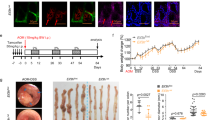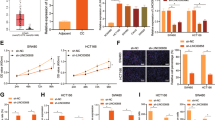Abstract
Abnormal regulation of gene expression is essential for tumorigenesis. Recent studies indicate that regulation of oncogene expression and neoplastic transformation are controlled by subunits of eukaryotic translation initiation factors (eIFs). Here we focused on eIF3 performing a pivotal role in protein synthesis and the differential expression of its subunits in cancer. The most uncharacterized non-core subunit eIF3m was confirmed to be highly expressed in human cancer cell lines and colon cancer patient tissues. By expression silencing with eIF3m-specific small interfering RNA (siRNA), we confirmed that eIF3m influences cell proliferation, cell cycle progression and cell death in human colon cancer cell line HCT-116. Using a ribonomics approach, we identified a subset of elF3m-influenced genes and showed that the expression of two highly represented tumorigenesis-related genes, MIF and MT2, were affected by eIF3m at the mRNA level. We also confirmed eIF3m-dependent regulation of MT2A downstream molecule CDC25A, which is necessary for cell cycle progression in HCT-116 cells. These results suggest that eIF3m mediates regulation of tumorigenesis-related genes in human colon cancer. Further investigations on tumorigenesis-related genes and their regulation by eIFs will provide clues for designing targeted therapy for cancer.
This is a preview of subscription content, access via your institution
Access options
Subscribe to this journal
Receive 50 print issues and online access
$259.00 per year
only $5.18 per issue
Buy this article
- Purchase on Springer Link
- Instant access to full article PDF
Prices may be subject to local taxes which are calculated during checkout








Similar content being viewed by others
References
Ahlemann M, Zeidler R, Lang S, Mack B, Münz M, Gires O . (2006). Carcinoma-associated eIF3i overexpression facilitates mTOR-dependent growth transformation. Mol Carcinog 45: 957–967.
Bach JP, Deuster O, Balzer-Geldsetzer M, Meyer B, Dodel R, Bacher M . (2009). The role of macrophage inhibitory factor in tumorigenesis and central nervous system tumors. Cancer 115: 2031–2040.
Bifulco C, McDaniel K, Leng L, Bucala R . (2008). Tumor growth-promoting properties of macrophage migration inhibitory factor. Curr Pharm Des 14: 3790–3801.
De Benedetti A, Graff JR . (2004). eIF-4E expression and its role in malignancies and metastases. Oncogene 23: 3189–3199.
Doldan A, Chandramouli A, Shanas R, Bhattacharyya A, Cunningham JT, Nelson MA et al. (2008). Loss of the eukaryotic initiation factor 3f in pancreatic cancer. Mol Carcinog 47: 235–244.
Dominguez A, Ramos-Morales F, Romero F, Rios RM, Dreyfus F, Tortolero M et al. (1998). hPTTG, a human homologue of rat pttg, is overexpressed in hematopoietic neoplasms. Evidence for a transcriptional activation function of hPTTG. Oncogene 17: 2187–2193.
Dong Z, Zhang J-T . (2006). Initiation factor eIF3 and regulation of mRNA translation, cell growth, and cancer. Crit Rev Oncol Hematol 59: 169–180.
Fukuchi-Shimogori T, Ishii I, Kashiwagi K, Mashiba H, Ekimoto H, Igarashi K . (1997). Malignant transformation by overproduction of translation initiation factor eIF4G. Cancer Res 57: 5041–5044.
Gingras AC, Gygi SP, Raught B, Polakiewicz RD, Abraham RT, Hoekstra MF et al. (1999). Regulation of 4E-BP1 phosphorylation: a novel two-step mechanism. Genes Dev 13: 1422–1437.
Green EM, Barrett CF, Bultynck G, Shamah SM, Dolmetsch RE . (2007). The tumor suppressor eIF3e mediates calcium-dependent internalization of the L-type calcium channel CaV1.2. Neuron 55: 615–632.
Huang DW, Sherman BT, Lempicki RA . (2009). Systematic and integrative analysis of large gene lists using DAVID Bioinformatics Resources. Nature Protoc 4: 44–57.
Humphries A, Wright NA . (2008). Colonic crypt organization and tumorigenesis. Nat Rev Cancer 8: 415–424.
Ino Y, Gotoh M, Sakamoto M, Tsukagoshi K, Hirohashi S . (2002). Dysadherin, a cancer-associated cell membrane glycoprotein, down-regulates E-cadherin and promotes metastasis. Proc Natl Acad Sci USA 99: 365–370.
Jin R, Chow VTK, Tan PH, Dheen ST, Duan W, Bay BH . (2002). Metallothionein 2A expression is associated with cell proliferation in breast cancer. Carcinogenesis 23: 81–86.
Jin R, Huang J, Tan PH, Bay BH . (2004). Clinicopathological significance of metallothioneins in breast cancer. Pathol Oncol Res 10: 74–79.
Kim JH, Richter JD . (2006). Opposing polymerase-deadenylase activities regulate cytoplasmic polyadenylation. Mol Cell 24: 173–183.
Koch G, Bilello JA, Kruppa J, Koch F, Oppermann H . (1980). Amplification of translational control by membrane-mediated events: a pleiotropic effect on cellular and viral gene expression. Ann N Y Acad Sci. 339: 280–306.
Komatsu K, Andoh A, Ishiguro S, Suzuki N, Hunai H, Kobune-Fujiwara Y et al. (2002). Increased expression of S100A6 (Calcyclin), a calcium-binding protein of the S100 family, in human colorectal adenocarcinomas. Clin Cancer Res 6: 172–177.
L′Espérance S, Popa I, Bachvarova M, Plante M, Patten N, Wu L et al. (2006). Gene expression profiling of paired ovarian tumors obtained prior to and following adjuvant chemotherapy: molecular signatures of chemoresistant tumors. Int J Oncol 29: 5–24.
LeFebvre AK, Korneeva NL, Trutschl M, Cvek U, Duzan RD, Bradley CA et al. (2006). Translation initiation factor eIF4G-1 binds to eIF3 through the eIF3e subunit. J Biol Chem 281: 22917–22932.
Legendre H, Decaestecker C, Nagy Y, Hendlisz A, Schüring M-P, Salmon I et al. (2003). Prognostic values of galectin-3 and the macrophage migration inhibitory factor (MIF) in human colorectal cancers. Mod Pathol 16: 491–504.
Lim D, Jocelyn KMX, Yip GWC, Bay BH . (2009). Silencing the metallothionein-2A gene inhibits cell cycle progression from G1- to S-phase involving ATM and cdc25A signaling in breast cancer cells. Cancer Lett 276: 109–117.
Mack DL, Boulanger CA, Callahan R, Smith GH . (2007). Expression of truncated Int6/eIF3e in mammary alveolar epithelium leads to persistent hyperplasia and tumorigenesis. Breast Cancer Res 9: R42.
Mauro VP, Edelman GM . (2002). The ribosome filter hypothesis. Proc Natl Acad Sci USA 99: 12031–12036.
Morris C, Wittmann J, Jack HM, Jalinot P . (2007). Human INT6/eIF3e is required for nonsense-mediated mRNA decay. EMBO Rep 8: 596–602.
Nam JS, Hirohashi S, Wakefield LM . (2007). Dysadherin: a new player in cancer progression. Cancer Lett 255: 161–169.
Pyronnet S, Imataka H, Gingras AC, Fukunaga R, Hunter T, Sonnenberg N . (1999). Human eukaryotic translation initiation factor 4G (eIF4G) recruits mnk1 to phosphorylate eIF4E. EMBO J 18: 270–279.
Ramachandran A, Madesh M, Balasubramanian KA . (2000). Apoptosis in the intestinal epithelium: its relevance in normal and pathophysiological conditions. J Gastroenterol Hepatol 15: 109–120.
Raught B, Gingras AC . (1999). eIF4E activity is regulated at multiple levels. Int J Biochem Cell Biol 31: 43–57.
Rosenwald IB . (2004). The role of translation in neoplastic transformation from a pathologist’s point of view. Oncogene 23: 3230–3247.
Silvera D, Formenti SC, Schneider RJ . (2010). Translational control in cancer. Nat Rev Cancer 10: 254–266.
Tenenbaum SA, lager PJ, Carson CC, Keene JD . (2002). Ribonomics: Identifying mRNA subsets in mRNP complexes using antibodies to RNA-binding proteins and genomic arrays. Methods 26: 191–198.
Tomko RJ, Azang-Njaah NN, Lazo JS . (2009). Nitrosative stress suppresses checkpoint activation after DNA synthesis inhibition. Cell Cycle 8: 299–305.
Zhang L, Pan X, Hershey JW . (2007). Individual overexpression of five of human translation initiation factor eIF3 promotes malignant transformation of immortal fibroblast cells. J Biol Chem 282: 5790–5800.
Zhang L, Smit-McBride Z, Pan X, Rheinhardt J, Hershey JW . (2008). An oncogenic role for the phosphorylated h-subunit of human translation initiation factor eIF3. J Biol Chem 283: 24047–24060.
Zhou C, Arslan F, Wee S, Krishnan S, Ivanov AR, Oliva A et al. (2005). PCI proteins eIF3e and eIF3m define distinct translation initiation factor 3 complexes. BMC Biol 3: 14.
Acknowledgements
We thank Dr Sri Ram for editorial assistance of manuscript. This study was funded by Intramural Research Grants of the National Cancer Center (NCC 0710660, NCC 0810160).
Author information
Authors and Affiliations
Corresponding author
Ethics declarations
Competing interests
The authors declare no conflict of interest.
Additional information
Supplementary Information accompanies the paper on the Oncogene website
Supplementary information
Rights and permissions
About this article
Cite this article
Goh, SH., Hong, SH., Hong, SH. et al. eIF3m expression influences the regulation of tumorigenesis-related genes in human colon cancer. Oncogene 30, 398–409 (2011). https://doi.org/10.1038/onc.2010.422
Received:
Revised:
Accepted:
Published:
Issue Date:
DOI: https://doi.org/10.1038/onc.2010.422
Keywords
This article is cited by
-
Alternative splicing acts as an independent prognosticator in ovarian carcinoma
Scientific Reports (2021)
-
Differential gene expression in peritumoral brain zone of glioblastoma: role of SERPINA3 in promoting invasion, stemness and radioresistance of glioma cells and association with poor patient prognosis and recurrence
Journal of Neuro-Oncology (2021)
-
Roles of eIF3m in the tumorigenesis of triple negative breast cancer
Cancer Cell International (2020)
-
The translational factor eIF3f: the ambivalent eIF3 subunit
Cellular and Molecular Life Sciences (2013)
-
Translation initiation in colorectal cancer
Cancer and Metastasis Reviews (2012)



